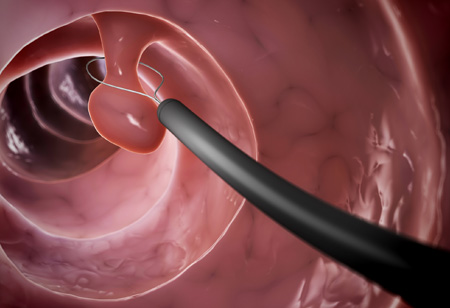If you have more than one polyp or the polyp is bigger than a centimeter youre considered at higher risk for colon cancer. It is normal to feel bloated and to have some abdominal discomfort.
 Are All Colon Polyps Precancerous Or Worse Honorhealth
Are All Colon Polyps Precancerous Or Worse Honorhealth
About 85 percent of polyps.
/adenomatous-polyp-symptoms-causes-diagnosis-and-treatment-4689050_color2-06a09539fd8a4061a5905672f814b055.gif)
How many polyps are normal in a colonoscopy. You should have a repeat colonoscopy usually 1 to 10 years later depending on. Doctors find and remove polyps during colonoscopy. Now there is evidence to show there is an increased risk of cancer if a patient has more than 30 hyperplastic polyps at the initial exam Dr.
If you have hemorrhoids or you had polyps removed you may have a small amount of bleeding. Five years ago they removed two. Approximately 1 percent of polyps with a diameter less than a centimeter are cancerous.
If the colonoscopy finds one or two small polyps 5 mm in diameter or smaller you are considered at relatively low risk. If the polyps found are adenomas there is an associated risk of colon cancer and you will need to be screened at least every 5 years because you are at risk of forming new polyps. Chances are you are genetically predisposed to forming them or you have been infected by a virus which has.
Colon polyps are very common in adults especially because the main risk factor for polyps is advancing age. The size of a polyp typically does make a difference. When colon polyps are identified as being pre-cancerous or dysplastic your doctor will take these criteria into account to determine your risk for cancer.
What is the cause for colon polyps. How Common Are Colon Polyps. On average 25 of adults who are 60 years old have one or more polyps.
There is a 25 to 30 chance that a repeat colonoscopy will find additional polyps. Factors That Increase Your Risk. How soon you need to return for follow-up depends largely on the size of the polyps found in the first exam.
Colorectal polyps should be removed because some can develop into cancer. For people with adenomatous polyps new polyps can appear in the future. Number of polyps you had.
These are benign Answered by Dr. Up to 50 percent of polyps greater than 2 centimeters about the diameter of a nickel are cancerous. Type and number of polyps.
After age 50 the risk of developing polyps doubles every 10 years. Your age and general health. What the heck is that word.
It is not normal to have that many polyps. Polyps lumps on the smooth lining of the colon or rectum are increasingly common after age 40. You should be passing gas.
We have many studies that have shown that if you start screening at age 45 for those at average risk and continue to screen until youre at least 75 years old the likelihood you will pass away from colon cancer is. Burkes team studied a group of 128 patients with polyps who were less than 40 years old and who had a follow-up colonoscopy. While the majority of colon cancers start as polyps only 5-10 of all polyps will become cancerous.
I went in for my five year colonoscopy and they removed three. Smoking obesity diabetes and inadequate exercise are risk factors for polyps but many people with none of these risk factors have precancerous polyps in the colon. Size of the polyps the larger the polyp the greater the risk of it.
The study revealed that 38 percent of young adults had high-risk polyps including 35 percent with advanced adenomas 9 mm or with any villous features or high-grade dysplasia. Weighing the Risk of Colon Cancer. Most polyps found during a colonoscopy are benign.
In most cases the polyps may be removed during a colonoscopy. While uncommon in 20 year olds more than 40 of persons over 50 have precancerous polyps in the colon. A colonoscopy is a procedure to examine the inside of your colon intestine with a scope.
I will estimate that approximately 1 out of every 3 patients between the age of 50 and 60 will have at least 1 polyp on a routine colonoscopy. Any more than three or so considered normal are something to be chemo brain cant think of the word diligent all I could come up with in observation anyone have a thesaurus. It is good that you had colonoscopy and had the polyps remo.
Polyps or tissue growths may have been removed during your colonoscopy. The best way to diagnose colon cancer and to beat colon cancer is to detect it early. Polyps are common in American adults and while many colon polyps are harmless over time some polyps could develop into colon cancer.

